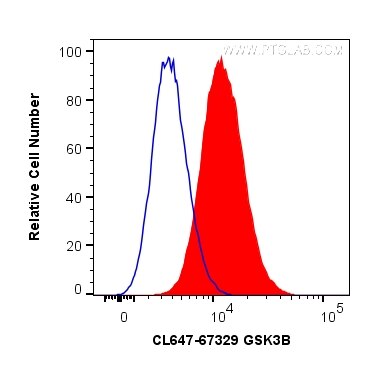GSK3B Monoklonaler Antikörper
GSK3B Monoklonal Antikörper für FC (Intra)
Wirt / Isotyp
Maus / IgG1
Getestete Reaktivität
Hausschwein, human
Anwendung
FC (Intra)
Konjugation
CoraLite® Plus 647 Fluorescent Dye
CloneNo.
2E9E4
Kat-Nr. : CL647-67329
Synonyme
Geprüfte Anwendungen
| Erfolgreiche Detektion in FC (Intra) | HepG2-Zellen |
Empfohlene Verdünnung
| Anwendung | Verdünnung |
|---|---|
| Durchflusszytometrie (FC) (INTRA) | FC (INTRA) : 0.20 ug per 10^6 cells in a 100 µl suspension |
| It is recommended that this reagent should be titrated in each testing system to obtain optimal results. | |
| Sample-dependent, check data in validation data gallery | |
Produktinformation
CL647-67329 bindet in FC (Intra) GSK3B und zeigt Reaktivität mit Hausschwein, human
| Getestete Reaktivität | Hausschwein, human |
| Wirt / Isotyp | Maus / IgG1 |
| Klonalität | Monoklonal |
| Typ | Antikörper |
| Immunogen | GSK3B fusion protein Ag17320 |
| Vollständiger Name | glycogen synthase kinase 3 beta |
| Berechnetes Molekulargewicht | 433 aa, 48 kDa |
| Beobachtetes Molekulargewicht | 46-48 kDa |
| GenBank-Zugangsnummer | BC000251 |
| Gene symbol | GSK3B |
| Gene ID (NCBI) | 2932 |
| Konjugation | CoraLite® Plus 647 Fluorescent Dye |
| Excitation/Emission maxima wavelengths | 654 nm / 674 nm |
| Form | Liquid |
| Reinigungsmethode | Protein-G-Reinigung |
| Lagerungspuffer | PBS with 50% glycerol, 0.05% Proclin300, 0.5% BSA |
| Lagerungsbedingungen | Bei -20°C lagern. Vor Licht schützen. Nach dem Versand ein Jahr stabil. Aliquotieren ist bei -20oC Lagerung nicht notwendig. 20ul Größen enthalten 0,1% BSA. |
Hintergrundinformationen
Glycogen synthase kinase-3 (GSK3) is a proline-directed serine-threonine kinase that was initially identified as a phosphorylating and inactivating glycogen synthase .GSK3B is involved in energy metabolism, neuronal cell development, and body pattern formation.In skeletal muscle, it contributes to insulin regulation of glycogen synthesis by phosphorylating and inhibiting GYS1 activity and hence glycogen synthesis. Researches showed that the crystal structure of human GSK3B, expressed in insect cells, at 2.8-angstrom resolution .
Protokolle
| PRODUKTSPEZIFISCHE PROTOKOLLE | |
|---|---|
| FC protocol for CL Plus 647 GSK3B antibody CL647-67329 | Download protocol |
| STANDARD-PROTOKOLLE | |
|---|---|
| Klicken Sie hier, um unsere Standardprotokolle anzuzeigen |


